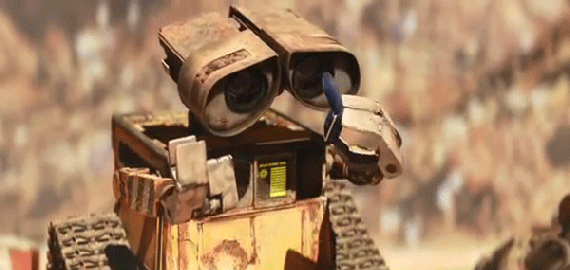Looking back at what the movie WALL-E has to say about how we live

This summer we’re bringing back our tech-in-entertainment series. To kick it off, here’s an interview we love on the lessons of “WALL-E.” The Pixar film is about a future where humans have ruined Earth’s environment with trash. They live in space, captives to screens, self-driving chairs, liquefied food and robot servants. One little robot is left on Earth to clean up the mess, until he finds love and ends up saving humanity from itself.
Host Molly Wood talked with sci-fi writer Kim Stanley Robinson, author of “New York 2140,” which also imagines a world transformed by environmental collapse. As it happens, “WALL-E” is one of his favorite movies, and he said some of the critiques it made about society more than 10 years ago are still incredibly relevant.
Environmentalism

“WALL-E” depicts an Earth in squalor, completely covered in trash left behind by its former human inhabitants.
Director Andrew Stanton may have denied the movie’s environmentalist message at the time, but the film on its own arguably showcased our planet’s growing problems with pollution and waste.
“There is a worldwide awareness of climate change and of environmental collapse, and that was also true in 2008,” Robinson said.
But despite the degraded conditions WALL-E found himself in, the movie still showed viewers there was potential for reform.
“There’s still one little sprig of a plant that WALL-E finds and realizes is different, as does Eve. So there’s the possibility of regeneration and of restoration that where there’s life, there’s hope,” Robinson noted.
Robinson points to the creation of the Paris climate agreement — a worldwide pact to reduce carbon emissions — as evidence that society has pushed for change on this issue.
Lifestyle and consumption

The concept of convenience very much takes the front seat throughout the latter half of “WALL-E” when it is revealed that humanity is still alive and kicking, though restricted to self-driving chairs.
As Robinson explains, humans in the film “are essentially like infants.”
“They can’t even move. They have to be fed. They’re being fed too much,” Robinson said. “They’ve got a ton of baby fat, and so adulthood has been taken away.”
That struck a nerve when Robinson watched the film for the first time.
“It was middle America on a summer vacation … in a theater where you got to eat pizza while you watch the movie … and we were sitting back in recliners,” he said. “It’s one of the very few satires that I think pokes a needle right into the heart of our lifestyle.”
Jobs and the modern economy

The film also arguably commented on the menial work that employees have to deal with.
“WALL-E looks like Sisyphus. He’s a worker bee,” Robinson said. “He has a stupid job to package trash into giant skyscraper like columns. It’s pointless in a way, and he’s just beavering away at it.”
Authors like David Graeber (“Bullshit Jobs: A Theory”) have started to point out how many of our jobs are meaningless. In the United Kingdom, nearly 40% of workers said they were quite sure that their jobs made no significant contribution to the world at all.
However, like many of the other themes in the film, “WALL-E” shows how the characters can upend the circumstances they’ve been placed in.
“[WALL-E] begins to make all kinds of mature adult decisions. He falls in love, does radical things, joins a revolution and overthrows the social order that already exists,” Robinson said.

Related links: more insight from Molly Wood
I don’t know if you spotted this about a week back, but Robert Downey Jr. was one of the featured speakers at re:Mars, a conference about space exploration put on by Amazon and Jeff Bezos. Downey actually announced Wall-E. Well, kind of. Downey announced a project called The Footprint Coalition whose goal is to help clean up the planet using advanced technologies. He said, “Between robotics and nanotechnology, we could probably clean up the planet significantly, if not entirely, within a decade.” OK, I’m down for that. Tell me more!
Well, there isn’t actually any more just yet, but Downey said the project will officially kick off by April 2020. I signed up for more information on the website.
Are there techie movies you want us to talk about? Let us know! We are at mptech@marketplace.org.
The future of this podcast starts with you.
Every day, the “Marketplace Tech” team demystifies the digital economy with stories that explore more than just Big Tech. We’re committed to covering topics that matter to you and the world around us, diving deep into how technology intersects with climate change, inequity, and disinformation.
As part of a nonprofit newsroom, we’re counting on listeners like you to keep this public service paywall-free and available to all.
Support “Marketplace Tech” in any amount today and become a partner in our mission.












